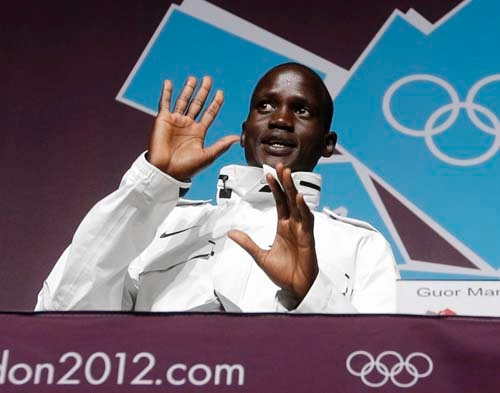For runner, life in Sudan was survival of fittest
LONDON -- The distance between Sudan and Egypt is just over 1,000 miles, a journey that when followed by the path of the sun takes you along the River Nile past pyramids covered with sands of another time. It is excruciatingly hot. There is little vegetation. Just mile after mile of dunes and desert rock.
It is hell for those who travel on foot.
Fourteen years ago, Guor Marial embraced it as his path to freedom.
His escape. His heaven.
The Olympic flame burns inside a marathoner who competes here under no nation, no flag and with no passport. He is all that is good about the games, a shining light that penetrates the cynical accounts of over-commercialism and doping allegations and delayed broadcasts.
The marathon route today will pass many landmarks, from Buckingham Palace to the Tower of London to the Victoria Memorial.
Along each of the 26.2 miles, Marial will run with a heart both joyful and heavy. He once did so to live.
He fled home at age 9 to escape the bloodshed of a civil war that would kill 2 million people across the African nation of Sudan, only to be kidnapped by gunmen and transported to a labor camp.
A week later, he and another young boy waited until the darkest time of night and ran. They huddled in a cave until dawn, believing the sun would be their guide away from the devastation and murder. They were caught and returned to the camp.
Five years later, he and an aunt ran again, this time all the way to Egypt, from which Marial at age 17 was brought to New Hampshire by the aid of others. He would later become a cross-country All-American at Iowa State.
His tale as a boy in the Sudan was described this way in the Concord Monitor back in 2005:
"Sitting in his classroom and hearing shooting; running for safety with his teacher into the woods and staying there for four days without food or protection from the mosquitoes; forced from his home four or five times a month and how sometimes his house got burned down and his family would have to rebuild; how he had his teeth knocked in by the butt of a rifle; how cousins died of starvation; and how his half-brother was shot to death running into the street trying to escape enemy troops."
Marial is 28 and listed here as IOA: Independent Olympic Athlete. He is one of four allowed by the International Olympic Committee to compete under the Olympic flag, a permanent resident of the United States who isn't a citizen. He qualified to run with a time of 2:14.32 in his first marathon.
"I want to take this opportunity to raise awareness of refugees all around the world," Marial said. "The last time I saw my family was 1993. That's almost 20 years. They will be able to watch me on TV (today). The nearest town is 30 miles away, and it is the rainy season in South Sudan. There is no vehicle or official road, so they will have to walk.
"I just want to tell them I love them so much. The whole country will be with me here. I hope to also bring awareness to the country and hope the young generation will see me and will be able to dream high for the years to come. But one dream has come true. The voice of South Sudan is alive."
South Sudan was formed in 2005 as part of a peace agreement . Marial wouldn't represent Sudan here and had 28 reasons why, the number of family members lost to violence or disease during times of turmoil.
His qualifying time suggests there is no medal in his near future . But he is a symbol of perhaps something much bigger than the round figure that indicates excellence at the games.
He will not hide in a cave but rather run free, his heart joyful for the experience and heavy for those who perished in the war that drove him away.
"Growing up, it was dangerous and hard," Marial said. "It was about survival of the fittest. If you survived one day, OK, what's going to happen the next day? Growing up there, I did not know the outside world.
"When I left my village and went to the city and came to Cairo and the United States, the world kept opening and opening. There are other things, not just about killing each other."
He will wear a black shirt today with no national symbol, no bright colors , nothing but his bib number of 2079.
But he will run like never before, full of hope, of gratitude, of life.
Las Vegas Review-Journal sports columnist Ed Graney can be reached at egraney@reviewjournal.com or 702-383-4618. He can be heard from 11 a.m. to 2 p.m. Monday through Friday on "Gridlock," ESPN 1100 and 98.9 FM. Follow him on Twitter: @edgraney.






















